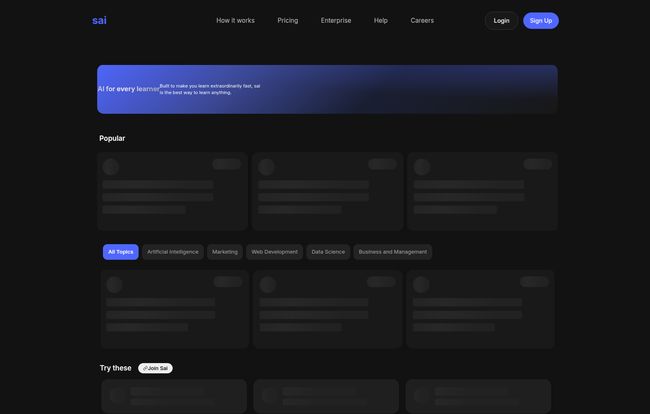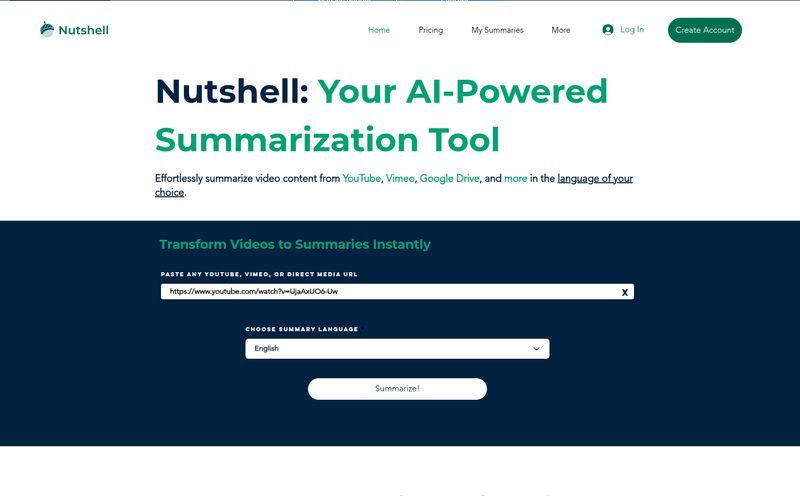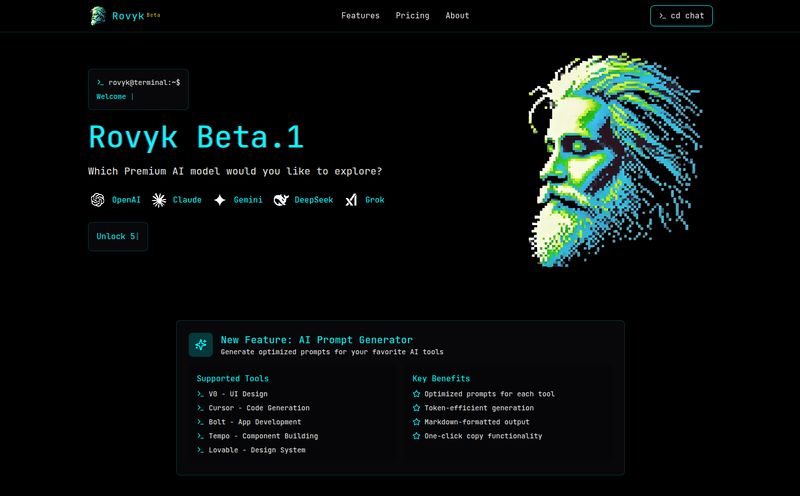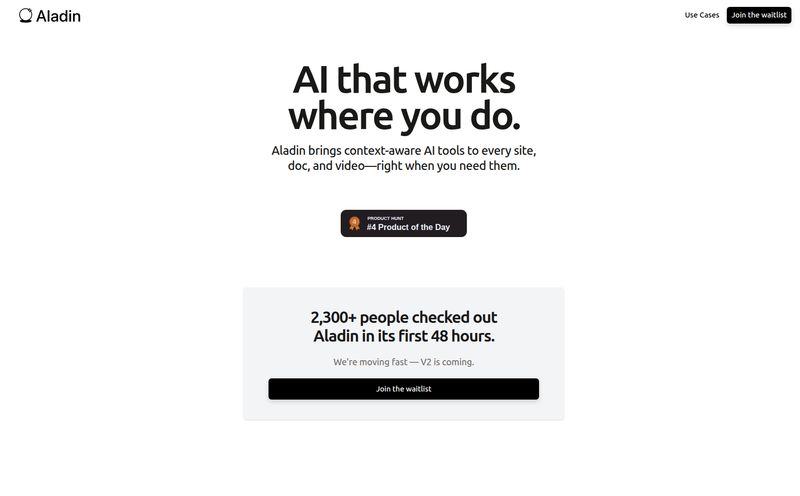I still get a cold sweat thinking about my university finals week. You know the scene: a desk buried under a mountain of textbooks, lecture notes that looked like cryptic scribbles, and enough instant coffee to power a small city. We were armed with highlighters and sheer desperation. That was it. Fast forward to today, and the student arsenal looks a whole lot different. It’s packed with AI.
Every week, it seems like there’s a new “revolutionary” AI tool promising to make studying effortless. Most are just wrappers for a generic language model, offering little more than a slightly souped-up search engine. So, when I came across Sai, I was skeptical. Another one? But this one felt… different. It bills itself as the “#1 AI for students,” a platform where you don’t just use AI, you build your own personal one. Now that got my attention.
So, let's pull back the curtain. As someone who spends their days neck-deep in SEO, traffic, and the tech that drives it, I wanted to give Sai a real, no-nonsense look. Is this the AI study partner we’ve been dreaming of since those caffeine-fueled all-nighters, or is it just another shiny distraction? Let’s find out.
What Exactly is This Sai Platform?
Okay, first things first. Sai isn't your typical chatbot. You don't just pop in a question and get a generic answer scraped from the web. The entire premise is built on personalization. Think of it less like asking a random person on the street for directions and more like consulting a personal research assistant that you’ve trained yourself. An assistant who has read every single one of your course documents.

Visit Sai
The magic starts when you upload your content. We’re talking lecture slides, PDF textbooks, your own messy notes, research papers—the whole lot. You feed this material to your “sai,” effectively creating a custom AI brain that knows your 'Intro to Macroeconomics' or 'Renaissance Art History' course inside and out. It’s a two-sided platform, aiming to connect students and professors, which is a fascinating angle. It suggests a move towards transparency and adapting university courses to AI, rather than just banning it outright.
How Sai Aims to Change Your Study Game
So you’ve built your little AI brain. Now what? This is where the platform starts flexing its muscles, turning your raw materials into genuinely useful study aids.
Creating Your Own Personal AI Brain
This is the core of it all. The “Create a sai” feature is front and center for a reason. By uploading your specific course materials, you're building a walled garden of knowledge. When you ask it a question, it's not pulling from some vast, and sometimes incorrect, corner of the internet. It's drawing directly from your professor’s lecture on the Krebs cycle or the specific case studies you’re meant to be analyzing. This level of focus is something I haven't seen executed this smoothly before. It gives you a sense of control over your learning, which is a powerful thing.
Instant Study Materials on Demand
Remember spending hours manually typing up flashcards? Or trying to guess what questions might be on the exam? Sai automates that grind. Once your content is uploaded, it can generate custom quizzes, flashcards, and comprehensive study guides in seconds. For me, this is the biggest time-saver. It’s not just about speed; it's about smart studying. The AI can generate questions that force you to connect concepts from different lectures, helping you spot your own weak points before the professor does. It’s an active study process, not a passive one.
More Than Just a Solo Act The Community Angle
This is an aspect that I think is being undersold. The platform has community features designed to bring students and even professors together. Imagine a professor setting up a “verified” sai for their course, ensuring all students are working from the same AI-powered playbook. It could be a fantastic way to tackle the whole academic integrity issue head-on. Instead of a shadow world of students using AI to cheat, it brings it into the light, making it a sanctioned, transparent tool for learning. This could bridge a huge disconnect in modern education.
Let's Get Real: The Good, The Bad, and The AI
No tool is a silver bullet. As much as I’m impressed by the concept, we have to look at the potential downsides. Let's get into the nitty-gritty.
The Upsides of a Custom AI Tutor
The advantages are pretty clear. The personalization is off the charts. Whether you're studying contract law or organic chemistry, the tool adapts because you provide the source material. The speed at which you can generate study materials is a massive boost for time-crunched students. And honestly, there's a real benefit to the collaborative features, creating a shared learning environment that feels very current. It’s a smart, adaptable, and powerful platform when used as intended.
The Potential Pitfalls and Red Flags
Now for the reality check. The old computer science adage, “garbage in, garbage out,” applies here more than ever. The effectiveness of your sai is 100% dependent on the quality of the content you upload. If your lecture notes are incomplete or you upload a poorly scanned, unreadable PDF, your AI assistant will be equally unhelpful. It's not a mind reader.
Then there's the big, philosophical debate. Does relying on an AI like this hinder the development of critical thinking skills? Some would argue yes. My take? A tool is just a tool. A calculator doesn't stop you from understanding math; it just handles the tedious computation. Similarly, Sai can handle the tedious task of organizing information, so you can focus on the higher-level job of understanding it. If you use it to just find answers without thinking, then yes, you’re short-changing your own education. The responsibility, ultimately, falls on the user.
The Big Question: What's the Price Tag on Sai?
This is the part of any review where I'd normally break down the pricing tiers. But here’s the thing: at the time of writing this, Sai doesn’t have a public pricing page. It's a bit of a mystery.
In the world of tech startups, this usually points to one of a few things. They could still be in a beta testing phase, they might be operating on a freemium model (basic features free, advanced ones paid), or they could be focusing on larger, university-wide enterprise deals. My gut tells me it's a mix of the latter two. For the most up-to-date information, your best bet is to head directly to their website and sign up to see what options are available.
An SEO's Final Take: Is Sai a Must-Have or Just Hype?
So, what’s the verdict? After digging through its features and philosophy, I’m genuinely optimistic. Sai is more than just hype. The focus on creating a custom, user-trained AI is the key differentiator that sets it apart from the flood of generic AI study tools. It positions itself not as a shortcut, but as a smarter way to engage with your own material.
It’s a tool that demands active participation. You have to be organized enough to upload good source material. You have to be disciplined enough to use the generated quizzes to actually test yourself, not just to find quick answers. If you can do that, Sai has the potential to be an incredibly powerful ally in your academic career. It represents a mature step forward in edtech—one that embraces AI as a collaborative partner in learning, not an enemy at the gates.
Frequently Asked Questions about Sai
1. Is Sai just for college students?
While it's clearly designed with university courses in mind, its framework could easily be adapted for high school students, professional certifications, or even self-learners who want to master a specific topic by feeding it books and articles.
2. Can Sai help with any subject?
Yes. Because you are the one who provides the training material, it's completely subject-agnostic. It works just as well for STEM fields like biology and computer science as it does for humanities subjects like marketing or history.
3. Is using an AI like Sai considered cheating?
This is the million-dollar question. It depends on your institution's policy and how you use the tool. Using it to generate study guides and flashcards from your own notes is generally considered smart studying. Using it to write an essay for you is academic dishonesty. Sai's focus on transparency and professor involvement seems aimed at encouraging ethical use.
4. How is Sai different from ChatGPT or other general AIs?
The main difference is the source of information. ChatGPT pulls from a massive, general dataset from across the internet. A “sai” that you create pulls only from the specific documents you uploaded. This makes its answers highly relevant and customized to your exact course, avoiding the generic or sometimes inaccurate responses of a general AI.
5. Do I need to be tech-savvy to use Sai?
Based on its interface, it appears to be very user-friendly. The process is straightforward: create an account, start a new “sai,” and upload your files. If you can use a platform like Google Drive or Dropbox, you should have no problem navigating Sai.
Conclusion
At the end of the day, the landscape of learning is changing, and it's changing fast. Tools like Sai are at the forefront of that shift. It’s not about making learning effortless—real learning is never truly effortless. It’s about making it smarter, more efficient, and more personalized. By putting the power of a custom-trained AI into the hands of students and professors, Sai offers a compelling glimpse into the future of education. A future where technology isn’t a crutch, but a powerful lever for deeper understanding. And for anyone who remembers the pain of a pre-digital finals week, that’s a pretty exciting prospect.
Reference and Sources
- Sai Official Website - The primary source for information on the platform and its features.



